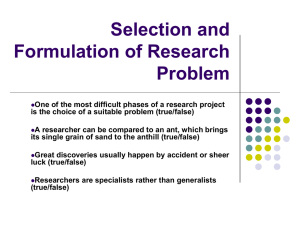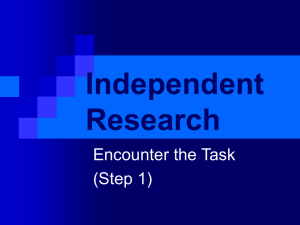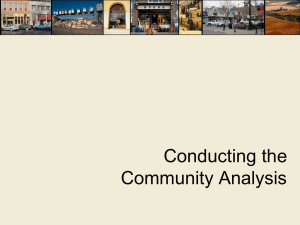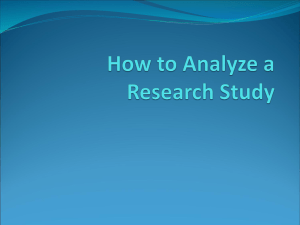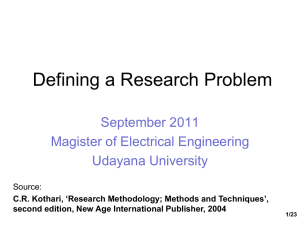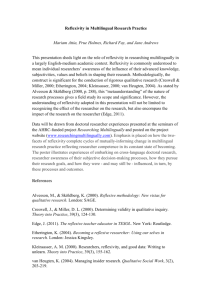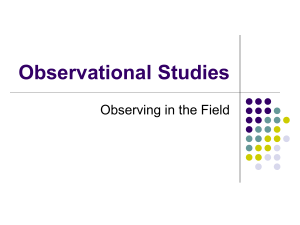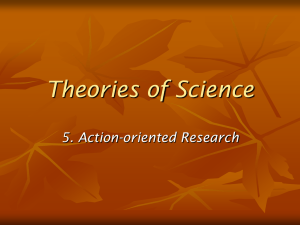Power, Passion, Rapport and Reflexivity - USQ ePrints
advertisement
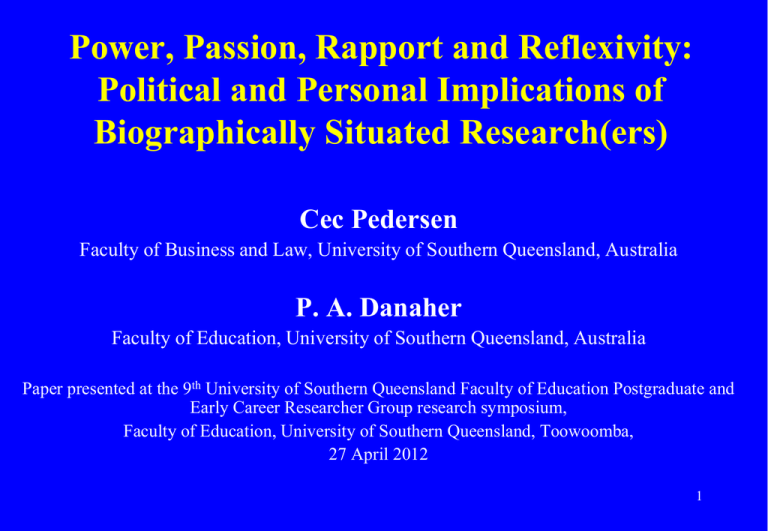
Power, Passion, Rapport and Reflexivity: Political and Personal Implications of Biographically Situated Research(ers) Cec Pedersen Faculty of Business and Law, University of Southern Queensland, Australia P. A. Danaher Faculty of Education, University of Southern Queensland, Australia Paper presented at the 9th University of Southern Queensland Faculty of Education Postgraduate and Early Career Researcher Group research symposium, Faculty of Education, University of Southern Queensland, Toowoomba, 27 April 2012 1 Overview Much current scholarship about education research is predicated on taking seriously the notion of the biographically situated researcher. This notion has significant political and personal implications, including particular stances on research ethics, negotiating multiple roles and responsibilities, and understandings of research quality and impact. 2 Introduction This paper elaborates these implications in terms of four principal themes in the literature as well as in the authors’ respective research work: power, passion, rapport and reflexivity. The intersections and tensions among these themes provide a framework for designing, implementing and evaluating research that is potentially engaged, illuminating and hopefully transformative in specific ways. 3 This framework is illustrated by reference to two current research projects: 1. the enactment of distributed leadership by senior managers in an Australian university; and 2. the exploration of academic work and identities in the Australian university sector. Each project draws on key elements of the respective researcher’s biographical situatedness and also deploys the interactions among power, passion, rapport and reflexivity to conduct research with considerable political, personal and professional implications. 4 Project 1: the enactment of distributed leadership by senior managers in an Australian university • The researcher has been a member of the academic staff of the university since July 1995. During that time, he has been actively involved in a range of management and governance roles ranging from academic, to Acting Head of Department, to Faculty Board member, to being an elected academic staff member of the university’s governing Council. This has involved the simultaneous and competing roles of academic staff member, researcher and Council member. Most of the researcher’s teaching has been in the overall discipline of management, with specific focus on the areas of human resource development and international management. Research and publications have focused on human resource development topics and tertiary teaching processes with a number of international conference presentations/publications, book chapters and journal articles. 5 The issue of researcher subjectivity is relevant on several levels: 1. as a researcher within the institution being studied; 2. as a member of the academic staff of the institution; and 3. as a member of the governing Council of the institution during the early tenure of the Vice-Chancellor who was involved in the study. This knowledge was built into the research design and added a depth and textualisation which otherwise might not be available in such a study because the researcher has: - a sound understanding of the governance and managerial processes, including the development of super-ordinate strategy, for the institution being studied; access to and understanding of secondary data sources (documents) which might ordinarily not be available to a researcher conducting a similar project; a higher level awareness of political and governance developments within the Australian university sector over the past decade; and ongoing reflexivity in relation to the researcher’s subjectivity (Lather, 1992) such as fortnightly meetings with supervisors and interviewing the V-C twice. 6 Project 2: the exploration of academic work and identities in the Australian university sector •Currently experiential and informal; hoping to develop into a more formal, preferably multi-institutional study •Interested in three distinct groups of academics: - early career researchers (Laudel & Glaser, 2008) - professors (Macfarlane, 2011) - research leaders (Meek, Goedegebuure, Carvalho, & Santiago, 2009) •Theoretically informed by identities as dynamic, multiple and performed 7 The issue of researcher subjectivity is relevant on several levels: 1. A continuing member of several academic communities 2. Daily engagements with competing priorities and multiple pressures 3. Daily applications of affective, behavioural, cognitive and social-emotional dimensions of identities 4. Seeking to understand others and self in the context of formal, paid work 8 The biographically situated researcher • How researchers position themselves and the resulting textual legitimacy have been discussed by a number of writers (Brown, 2001; Lather, 1992; Prain, 1997) • Power, passion, rapport and reflexivity confirmed as useful encapsulating themes in conducting both research projects and more broadly in engaging with contemporary education research 9 Conclusions • A writer (and researcher) does not have to be free of bias in this sort of study; however, s/he should be fully transparent so the reader knows the researcher’s perspective. • The never-ending story (or at least the unfinished project) of taking seriously the political and personal implications of biographically situated research(ers) 10 References Brown, L. M. (2001). Leading leadership development in universities: A personal story. Journal of Management Inquiry, 10(4), 312-323. Lather, P. (1992). Critical frames in educational research: Feminist and poststructural perspectives. Theory into Practices, 31(2), 87-99. Laudel, G., & Glaser, J. (2008). From apprentice to colleague: The metamorphosis of early career researchers. Higher Education: The International Journal of Higher Education and Educational Planning, 55(3), 387. Macfarlane, B. (2011). Professors as intellectual leaders: Formation, identity and role. Studies in Higher Education, 36(1), 57-73. Meek, V. L., Goedegebuure, L., Carvalho, T., & Santiago, R. (Eds.) (2009). The changing dynamics of higher education middle management. Dordrecht, The Netherlands: Springer. Prain, V. (1997). Textualizing your self in research: Some current challenges. 11 Journal of Curriculum Studies, 29(1), 71-85.

